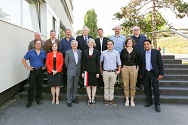ARCHIVE - De l'administration à la gouvernance olympique : défis pour notre siècle
Symposium organisé à l’occasion du centième anniversaire de la présence du CIO à Lausanne
Pierre de Coubertin a installé le siège administratif du CIO à Lausanne le 15 avril 1915. Lausanne est aujourd’hui la capitale administrative du sport mondial. Cent ans après l’installation du CIO dans ce qui allait devenir, sous Juan Antonio Samaranch, la « capitale olympique », les défis olympiques ont changé mais restent multiples. Il n’est plus trop question d’amateurisme marron ou d’Olympie moderne, mais de sport pour tous, d’antidopage, de résultats truqués, de redistribution des revenus, de responsabilité sociale, de villes candidates, de transparence, de nouveaux médias, de durabilité, de sécurité, de statuts légaux et fiscaux, etc. Ce symposium académique aborde certains de ces thèmes sous l’angle de plusieurs disciplines. La première demi-journée traite de l’intégrité sportive (dopage, éthique, trucage de résultats, gouvernance...) et la seconde de l’organisation et des impacts des JO (taille, coût, durabilité...).
Symposium organised on the one-hundredth anniversary of the IOC Administration in Lausanne
Pierre de Coubertin made Lausanne the IOC administrative headquarters on 15th April 1915. Lausanne is today the capital of international sport administration. One hundred years after the move to what would become the “Olympic Capital City” under Juan Antonio Samaranch, the Olympic challenges have changed but are always many. Fake amateurism and modern Olympia are not the order of the day, but sport for all, anti-doping, match-fixing, revenue redistribution, social responsibility, bidding cities, transparency, new media, sustainability, security, legal and fiscal status, etc. are much talked about. This academic symposium discusses some of these topics through the lenses of several disciplines. The first half-day is dedicated to sport integrity (doping, ethics, match-fixing, governance, etc.) and the second half-day deals with the organisation and impact of the Olympic Games (size, cost, sustainability, etc.).
Programme
Brochure (1779 Ko)
Première partie 25 juin 2015 : Intégrité sportive et olympique
| 13:30-15:00 | ||
|
Nicolas Bancel, Université de Lausanne Patrick Clastres, SciencePo Paris |
Le CIO et la gestion des grandes crises du XXe siècle | N. Bancel P. Clastres - IOC in front of 20th century major crisis (111 Ko) |
| Jean-Loup Chappelet, Université de Lausanne | De l'administration à la gouvernance olympique | J.-L. Chappelet - Administration à Gouvernance Olympique (387 Ko) |
|
Olivier Aubel, Université de Lausanne Fabien Ohl, Université de Lausanne |
La nouvelle politique de lutte contre le dopage de l’UCI : un cas emblématique pour le monde olympique | F. Ohl O. Aubel - La nouvelle politique de lutte contre le dopage de l'UCI (987 Ko) |
| 15:00-15:30 | Pause | |
| 16:00-17:00 | ||
| Emmanuel Bayle, Université de Lausanne | Responsabilité sociale olympique : un défi pour le futur | E. Bayle - Responsabilité sociale olympique (808 Ko) |
| Charlotte Cabane, Université de St-Gall | Pratique sportive et olympisme | C. Cabane - Olympisme et pratique sportive (149 Ko) |
| Margareta Baddeley, Université de Genève | Le système olympique et le Tribunal Arbitral du Sport | M. Baddeley - Système Olympique et TAS (380 Ko) |
| 17:00-17:30 | Pause | |
| 17:30-19:00 | ||
| Richard Pound, IOC member in Canada | Are the Olympic Games still manageable? | R. Pound - Management of Big Games (203 Ko) |
| Boria Majumdar, University of Central Lancashire | India and the Olympics: The time to go? | B. Majumdar - India and the Olympics (1461 Ko) |
Second part 26 June 2015 : Organisation and impact of the Olympic Games
| 9:00-10:30 | ||
| John McAloon, University of Chicago | Agenda 2020 and the Olympic Movement | J. McAloon - Agenda 2020 and the Olympic Movement (188 Ko) |
| Milena Parent, University of Ottawa | The governance of Olympic Games in Canada | M. Parent - Governance Olympic Games Canada (2077 Ko) |
| Otto Schantz, University of Koblenz | Coubertin's humanism facing post-humanist ambitions and visions of the Olympic Games | O. Schantz - Olympism Posthumanism (896 Ko) |
| 10:30-11:00 | Pause | |
| 11:00-12:30 | ||
| Kostas Georgiadis, University of the Peloponnese | The Athens 2004 Games, ten years later | K. Georgiadis - Olympic Games of Athens 2004 10 years after their staging (10461 Ko) |
| Ian Henry, University of Loughborough | The impact and legacy of the London 2012 Games | I. Henry - Impact and legacy of the London 2012 Games (716 Ko) |
| Joël Pinson, University of Lausanne | The evaluation of the Lausanne Olympic Capital strategy | J. Pinson - Evolution Lausanne strategy (673 Ko) |
| 13:00 | End of symposium |

